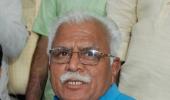Opposing the Sutlej-Yamuna Link canal at a meeting with his Haryana counterpart, Punjab chief minister Amarinder Singh on Tuesday warned that it is an emotive issue in his state and “Punjab will burn” if asked to share water.

Meeting Haryana CM Manohar Lal Khattar and Union Jal Shakti Minister Gajendra Singh Shekhawat through a video link, the Punjab CM argued that the SYL canal issue could disturb national security.
Both states stuck to their stands at the meeting convened on the directions of the Supreme Court, which asked the Centre on July 28 to mediate between them on the decades-old issue.
But the two CMs described the interaction – the first such meeting between them on the SYL project -- as “cordial” and agreed to talk again.
Punjab is reluctant to share water with Haryana through the SYL canal project, saying it has nothing to spare. Amarinder Singh reiterated the need for a tribunal for a time-bound assessment of river water availability.
“You have to look at the issue from the national security perspective,” he told Shekhawat, according to a Punjab government statement.
“If you decide to go ahead with SYL, Punjab will burn and it will become a national problem, with Haryana and Rajasthan also suffering the impact,” he added.
Shekhawat and Khattar joined the video conference from Delhi. Linking the SYL debate with national security, Singh said Punjab remained at risk from all quarters.
He said Pakistan was continuing with attempts to foment trouble and was trying to revive the separatist movement through the banned Sikhs for Justice organisation.
The water issue could further destabilise the state, he warned, according to the statement.
Singh described the meeting as “amicable and cordial”.
Haryana CM Khattar hoped for an amicable solution to the dispute.
“We maintained our stand that the SYL should be constructed. The Supreme Court too has said that,” he told reporters after the meeting.
SYL has been a contentious issue between the two states with the Punjab portion of the canal still incomplete.
The construction began in 1982.
Punjab has been demanding reassessment of the Ravi-Beas river waters' volume while Haryana has been seeking completion of the SYL canal to get its share of 3.5 million acre feet (MAF) of water.
Amarinder Singh claimed Punjab had a right to Yamuna water, in which it did not get a share at the time of 60:40 division of assets with Haryana during the state's division in 1966.
He also expressed his willingness to sit across the table with his Haryana counterpart to discuss the “emotive” issue.
Union Jal Shakti Minister Gajendra Singh Shekhawat suggested that the SYL could be completed while discussions on water sharing continue for arriving at a final formula.
“Punjab and Haryana CMs placed their viewpoints on the issue and we have decided to have another meeting soon,” he told reporters.
“At the next meeting, talks will be held from the point where we ended them today and whatever the outcome, we will apprise the Supreme Court about it," he said.
He called the meeting cordial and positive.
Amarinder Singh said that there had been no scientific assessment of the available river waters in Punjab till date, pitching for setting up of a tribunal for fair adjudication of it.
Singh said it was necessary to set up a tribunal for fair adjudication of the water availability.
He pointed out that the water sharing proposed by Eradi Commission was 40 years old, while international norms require a review every 25 years to ascertain the status.
In fact, there have been no adjudication or scientific assessment of available Punjab river waters till date, a statement quoted Singh as saying.
The chief minister said the Bhakra Beas Management Board had reported that availability of Ravi-Beas water had come down from the estimated 17.17 million acre-feet in 1981 to 13.38 million ac-ft in 2013.
Despite being a non-basin state, having a smaller population and lesser cultivated land area, Haryana's total availability of river water stood at 12.48 million ac-ft against Punjab's 12.42 million ac-ft, Singh said.
He pointed out that the trans-basin transfer of water could only be allowed from a surplus basis to a deficit basis and, "as of today, Punjab is a deficit state and could not therefore be asked to transfer water to Haryana".
The chief minister said he had taken a concerted decision to terminate all water agreements back in 2004 to "save" Punjab from burning, amid reports that violence could erupt in the state in protest.
The situation had aggravated since then, he said, adding that 109 of the state's 128 blocks had officially been declared "dark zones".
Pointing to the melting glaciers, he urged the central government to take the climate change effects into account.
The situation is "likely to worsen" with China constructing dams in their territory, Singh warned, adding that this would lead to water shortage even in the Sutlej.
"Why would I not agree to give water if we had it?" Singh asked, adding that certain areas of south Haryana were, in fact, part of the erstwhile Patiala estate and he personally had special love for the region.
Singh recalled that he had suggested construction of water storage dams in Himachal Pradesh for collecting water so that the flow of water into Pakistan could be checked.
He urged Shekhawat to consider the suggestion and also suggested that Rajasthan be involved in discussions on the SYL Canal/Ravi-Beas waters issue as it was also a stakeholder.
Punjab has been demanding reassessment of the Ravi-Beas river waters' volume, while Haryana has been seeking completion of the SYL canal to get its share of 3.5 million ac-ft of the river waters.










 © 2025
© 2025